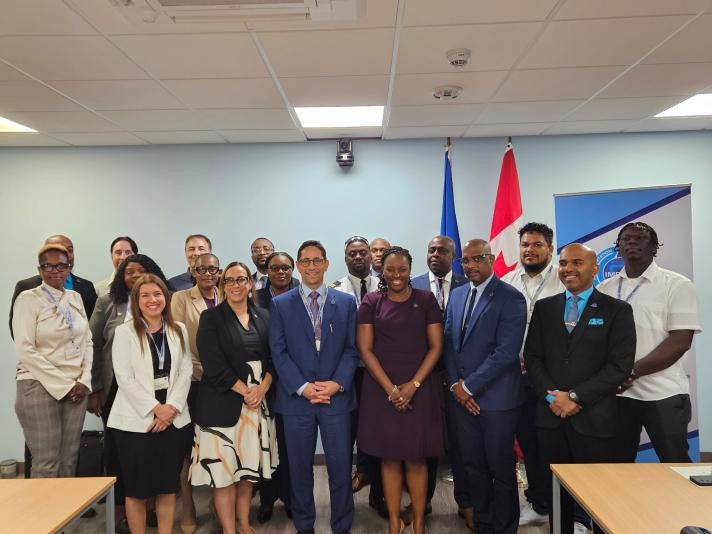A critical, high-level workshop targeting the illicit trade and trafficking of glass eels, often linked to transnational organised crime, was officially opened on 20 November 2025 in Bridgetown for Crime and Security (IMPACS) and supported by the Canadian High Commission and Auxilium Worldwide, brought together regional law enforcement, customs, fisheries and environmental protection agencies to enhance their investigative capacity against this growing environmental crime.
Speaking at the start of the workshop, Ms. Nadine Bushell, Assistant Director – Projects, CARICOM IMPACS, warned that organised criminals were evolving and leveraging gaps in knowledge of natural resource and environmental crime issues to evade detection by law enforcement. She lamented that these environmental crime activities converge with other serious transnational organised crimes and nefarious activities that put the Caribbean Region at risk.
“At CARICOM IMPACS, we have observed a troubling acceleration in transnational organised criminal networks exploiting the Region’s natural resources for profit. The extremely high value of glass eels in the global market has made this a lucrative commodity that has been set upon by criminal actors who target these low-risk and high-value commodities as they diversify their criminal activities beyond the well-known crimes that law enforcement typically monitor and scrutinise”, she explained.
Ms. Bushell added that CARICOM IMPACS remains a steadfast advocate for the protection of the Caribbean’s natural resources and noted that addressing environmental crime and natural resource exploitation by criminals calls for deeper regional cooperation to strengthen the Caribbean’s collective response to this nefarious activity.
Her Excellency Brenda Wills, High Commissioner of Canada to Barbados and the Eastern Caribbean, said globally, the illegal trade in eels is estimated to be worth up to US$3 billion annually and that the Caribbean has become a key location for the capture and illegal export of eels, often destined for markets in Asia via North America.
“This illicit trade threatens biodiversity, undermines legal economies and erodes the rule of law. Canada recognises the importance of regional cooperation in tackling these crimes and is proud to support initiatives like this workshop – which help to strengthen intelligence sharing, build capacity and fosters collaboration across borders”, she emphasised.
The High Commissioner added that combatting wildlife trafficking required a whole-of-system approach, strong legislation, effective enforcement and robust reporting mechanisms coupled with education and awareness to ensure the public’s understanding and vigilance, so that these crimes do not flourish in the shadows.
Dr. David Soud, Subject Matter Expert at Auxilium Worldwide and workshop facilitator, stated that while eels may seem insignificant, they are key components of different types of aquatic ecosystems around the world, both as a food source when young and predators when mature. He explained they are a highly valued food source for human beings, especially in Asia, where most of the world’s eel products – over 150,000 tonnes of them – are consumed annually, including in sushi restaurants everywhere.
“The challenge for us here in the Caribbean is that this demand for eels has driven multiple species onto endangered lists. In the past few decades, we have seen a cascading decline in eel species. The illicit trade in eels is a highly lucrative, multi-million-dollar criminal enterprise spanning the Caribbean, with estimates for the Region’s total trafficking volume ranging from 20 to over 100 tonnes annually” he revealed.
This trade is concentrated in key source countries including Cuba, the Dominican Republic, Haiti and Jamaica. The financial incentive is staggering as glass eels sell for as much as US$5,000 per kilogram to local collectors before being moved to concealed warehouses. They are then exported through North America (the United States (US) and Canada) for onward re-export to Hong Kong and the lucrative Asian eel farming industry, with prices multiplying several times along the route.
Dr. Soud further added that the high value and complex logistics of this trade have drawn in global organised crime groups (OCGs), many of whom are already involved in trafficking drugs, weapons and human beings. “These networks orchestrate the entire process, from collection to movement and money laundering. Crucially, the legitimate global eel market, which is valued at billions, is exploited, allowing OCGs to use the legal supply chain to launder the proceeds generated not only from the eel black market itself but also from their other, broader criminal activities,” he continued.
He said the purpose of the workshop was for CARICOM IMPACS and its partners to achieve comparable agility and efficiency in countering the threat of the illicit trade in eels. “CARICOM IMPACS is uniquely suited to address this challenge, because to take on criminal networks, we need well-networked law enforcement and security agencies. We plan to emerge from this workshop better informed and better equipped to undertake this important work,” he assured.
The intensive programme includes sessions on emerging methodologies used by traffickers, data analysis to trace financial flows and case studies detailing successful global interventions. Participants were drawn from across CARICOM Member States, ensuring a unified approach to addressing trafficking routes and enforcement challenges across multiple jurisdictions.



